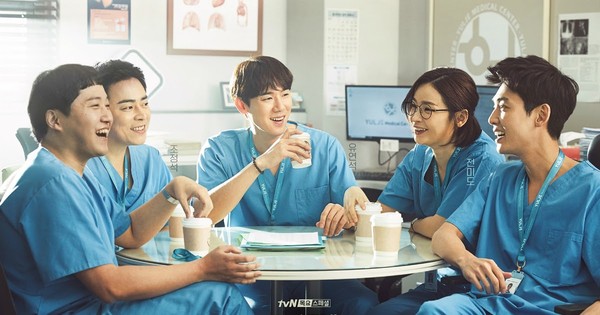The first season of Hospital Playlist, which ranked number one on Netflix Korea for multiple weeks in a row, aired its final episode at the end of last month with huge success. As the most recent television series by Director Wonho Shin, who also directed the hit series Reply and Prison Playbook, Hospital Playlist is yet another show revolving around a group of best friends. It follows the lives of five doctors — Ik-jun, Jung-won, Seok-hyeon, Joon-wan and Song-hwa — who met in their first year of pre-med and now work together in the same hospital, sharing a 20-year friendship. It was definitely addictive, even for me — someone not usually a fan of K-dramas. However, it was also far from perfect, considering the lack of narrative in some places, the addition of random and unnecessary scenes in others, and the fact that too many genres were mashed up into a show that’s only 12 episodes long. While it was a delightful show, it is questionable whether it deserved the attention it received.

Shin’s shows are known for being feel-good and lightly comedic, and Hospital Playlist is no exception. This is achieved through a very distinctive way compared to typical K-dramas, and these differences are what makes his shows so popular. Instead of having one male and one female lead (who obviously fall in love with each other), it has multiple characters who each have a moving story to tell. In particular, what viewers enjoy most about these series are the wholesome interactions and the resulting chemistry between the characters who truly love and care for each other as friends rather than lovers. Such heartfelt plotlines could easily become cringeworthy and tacky, but the narrative is conveyed successfully by first-rate actors. While many K-dramas suffer from “acting holes”, referring to unqualified actors whose performances are so poor that they actually distract the viewers, Shin’s shows are known for casting only the right actors to the roles they fit perfectly, even for the smallest parts.
Though love is an important element in the plot, which is typical of Korean shows, it is portrayed as something pure and tender rather than as something dramatic or a source of conflict. This is done through innocent characters who are unfamiliar with such emotions. Jung-won, for example, is a sincere Catholic who was always closer to God than girls before he fell in love with Gyeo-wool. There is also Minha, a urologist working in the same hospital as the five, whose crush for Seok-hyeong started from the admiration and respect she had for the kind of doctor he is. However, it is regrettable that the series was not bold enough to completely abandon the success formula for K-dramas. While the romantic elements were only subplots in the beginning, they rose to take up most of the spotlight as the season progressed. In the end, the producers even broke the perfect harmony amongst the five friends by letting Ik-jun develop feelings for Song-hwa, which resulted in a handful of awkward scenes that were torturous to watch.
Another disappointment was that the show tried to do too many things. Being a mixture of Grey’s Anatomy and Friends in the beginning seemed enough. Then, the five friends made a band, so it had to be a musical too. Then came the excessive amount of romance. And to put all these in a 12-episode season obviously resulted in a lack of cohesive narrative. For instance, there was no clear trigger for Joon-wan to suddenly fall in love with his best friend’s sister after only seeing her once for the first time in many years. Although the couple had a firm fanbase for the chemistry between the actors, it was difficult to simply accept the fact that Joon-wan found his true love, especially when he was known for never being serious in his past relationships. There were similar moments in the plot that lacked the necessary narratives from different points of view.
While the plot had its limitations and flaws, it must also be taken into consideration that the series was produced with a second season in mind. Given that the first season definitely had distinctive advantages, we may as well give the follow-up season another chance to mend its plot holes and develop further on its strengths. Though it is yet to be proved that the series deserved the success it has gained so far, for now, I would say don’t ponder too much about the plot and tune into the Hospital Playlist to let yourself a little delight.

